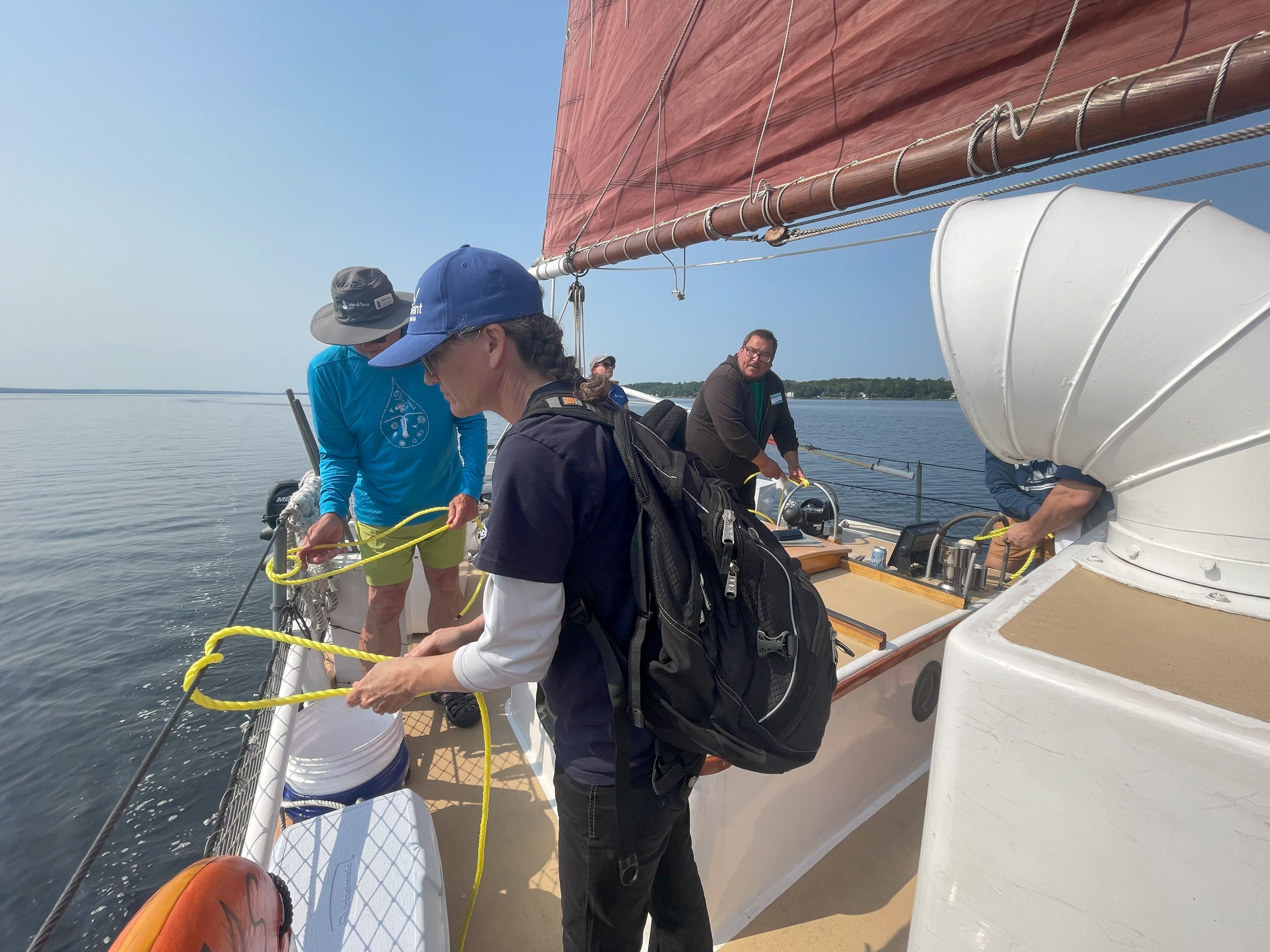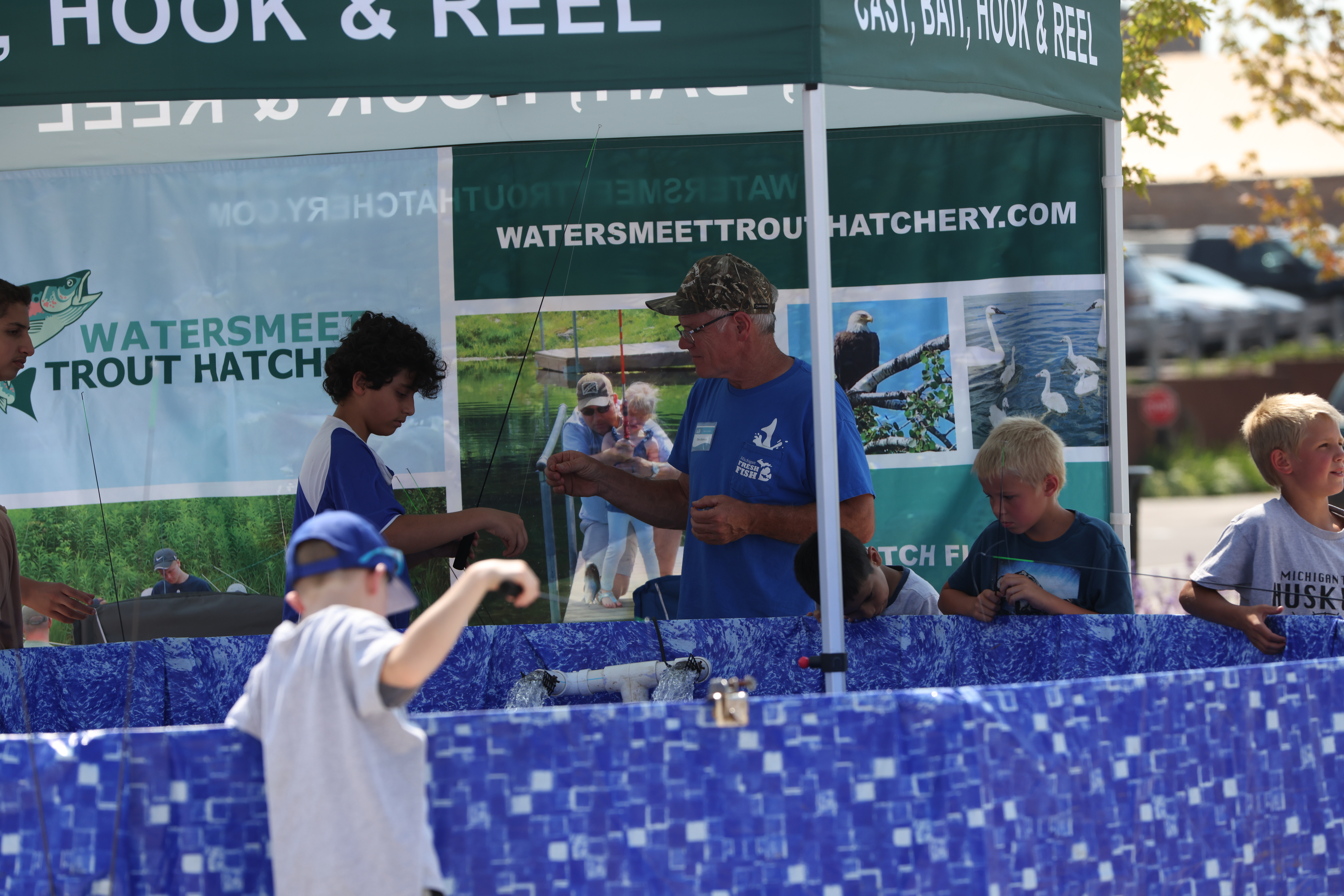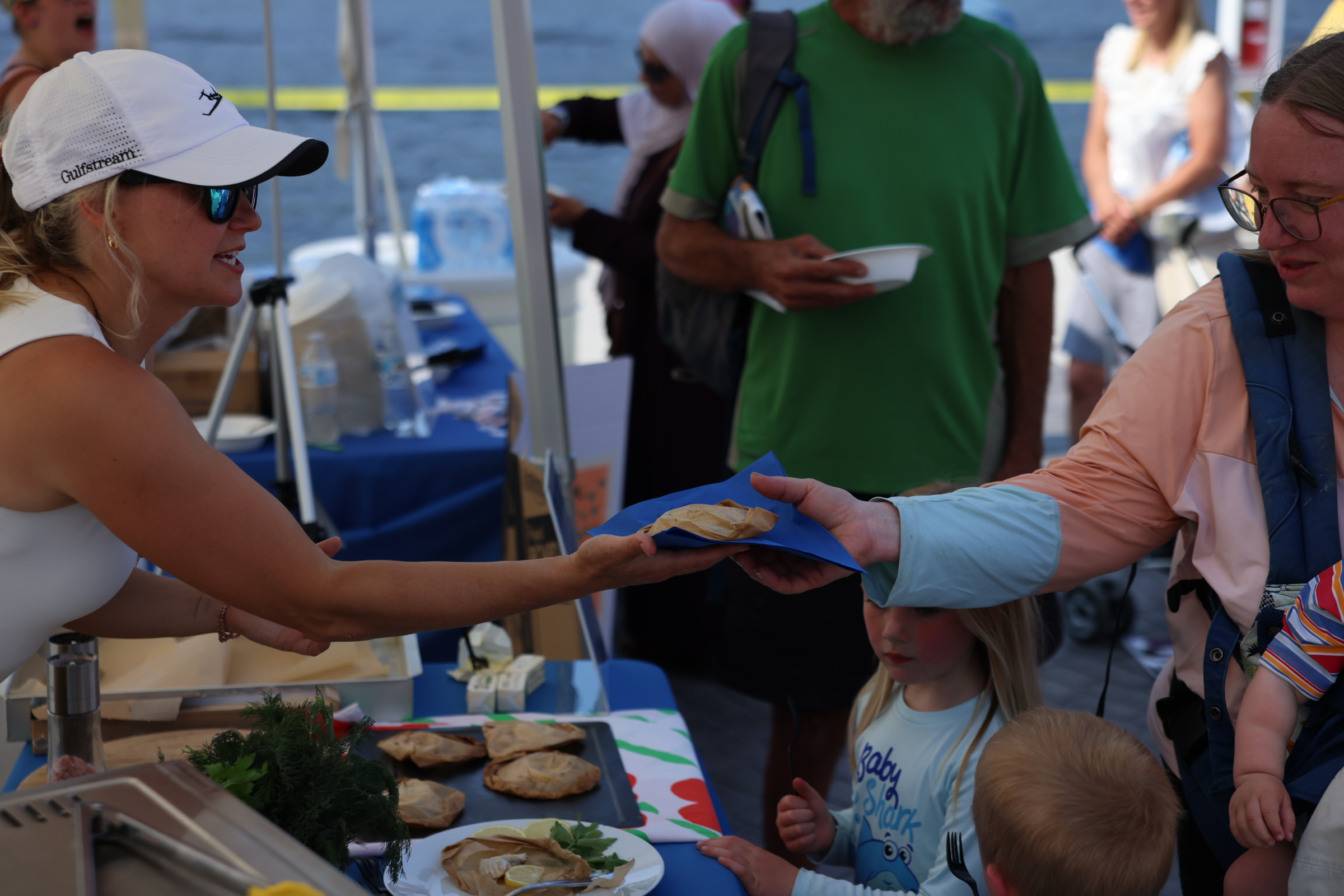Mi Fresh Fish Sail & Fry celebrates western UP fisheries
From an Inland Seas tall ship educational workshop on Lake Superior, to fresh fish fried on land for tasting, Houghton visitors and residents learned about Michigan's fisheries industries.

In July 2024, Upper Peninsula residents and visitors were treated to the sight of a familiar tall ship schooner docked at a new pier - LOHO (Lower Houghton) - in Houghton, Michigan. Inland Seas, an educational vessel-based educational group from Suttons Bay, Michigan, arrived on Lake Superior for the second time to offer sea excursion workshops and place-based education. Inland Seas partnered with Michigan State University Extension and Michigan Sea Grant in a day dedicated to celebrating and bringing together the local fisheries first with a morning sail and then an evening fish fry.
Sailing and learning
In the morning of July 12, 25 Yoopers (U.P. residents) and visitors participated in a fish-worthy sail on board the Inland Seas tall ship schooner. During this workshop, participants sailed off, first giving thanks to Lake Gichigami and praying for a safe voyage ahead. This led to participants hearing from Keweenaw Bay Indian Community Natural Resource Department (KBIC-NRD) about the origin of our waterways and traditional stories that we may take part in while embracing the culture around us within the 1842 treaty territories.
After working together to raise the sails, the group navigated the waterways of the Portage Canal and also engaged in small group presentations with experts including:

- Watersmeet Trout Hatchery & Fish Farm explaining their operation as the only trout farm in the UP;
- First Catch Fishing teaching about Tribal commercial fishing and how to tie various maritime knots;
- Minnesota Sea Grant explaining about native and non-native species across the decades;
- Teach to Taste offering the culinary touch on the benefits of eating fish from our local food system;
- and Geoheritage with Michigan Technological University (MTU) describing how our waterways were created, driving the culture and heritage in which our fish and community resides.
Michigan Sea Grant’s Lauren Jescovitch wrapped up the day speaking on the purpose of being together to celebrate our local fisheries under the brand Mi Fresh Fish by saying, “Today we heard stories and teachings from our local fisheries experts and we hope you take that with you as we continue dockside to celebrate and learn about the history, current, and future of our sustainable fisheries and seafood system.”
Mi Fresh Fish fish fry
That afternoon shoreside participants and other visitors joined together to continue enjoying Mi Fresh Fish with a fish fry. Nearly 200 people celebrated at this event that showcased U.P. partners working with subsistence fishing, commercial fishing, and fish farming.

Visitors were welcomed at the Mi Fresh Fish tent with educational and marketing materials about Mi Fresh Fish, were able to see live fish at the aquaculture demo tank, and even enjoy a virtual tour at a Michigan fish farm using the 360 Virtual Reality Headset. Visitors learned to tie their own fly for fly fishing from Copper Country Trout Unlimited, try their hand at fishing with Watersmeet Trout Hatchery and Fish Farm, and even learn how to filet their own caught fish!
Activities helped explain about local fisheries, fish identification, and watersheds and were provided by community partners such as Great Lakes Indian Fish and Wildlife Commission, KBIC-NRD, Great Lakes Aquaculture Collaborative, Lake Superior Stewardship Initiative, and MTU Center for Science and Environmental Outreach.
And of course, everyone enjoyed being able to taste some local fresh fish. Options included fried fish from the First Catch Fishing mobile food truck, learning how to cook and taste the end creation with Teach to Taste who served a fish pasty and a pan-seared trout power breakfast, and a traditional midwest fish boil with fish provided by Peterson's Fish Market.

What is Mi Fresh Fish?
Mi Fresh Fish uplifts all fish produced in Michigan. This includes fish produced from farmed and wild harvests for food, bait, stocking, fee-fishing, or ornamental products. The goal is to educate and bring awareness to Michiganders that aquaculture, commercial fishing, and seafood processing industries exist in Michigan and that they are not just businesses, but also our neighbors. If you would like to learn more, dive in and visit Mi Fresh Fish online.
Michigan Sea Grant helps to foster economic growth and protect Michigan’s coastal, Great Lakes resources through education, research, and outreach. A collaborative effort of the University of Michigan and Michigan State University and its MSU Extension, Michigan Sea Grant is part of the NOAA-National Sea Grant network of 34 university-based programs.
This work was supported by the U.S. Department of Agriculture - National Institute of Food and Agriculture, North Central Regional Aquaculture Center Program [grant number 2020-38500-32560]. This article was prepared by Michigan Sea Grant under award NA22OAR4170084 from the National Oceanic and Atmospheric Administration, U.S. Department of Commerce through the Regents of the University of Michigan. The statement, findings, conclusions, and recommendations are those of the author(s) and do not necessarily reflect the views of the National Oceanic and Atmospheric Administration, the Department of Commerce, or the Regents of the University of Michigan.



 Print
Print Email
Email

